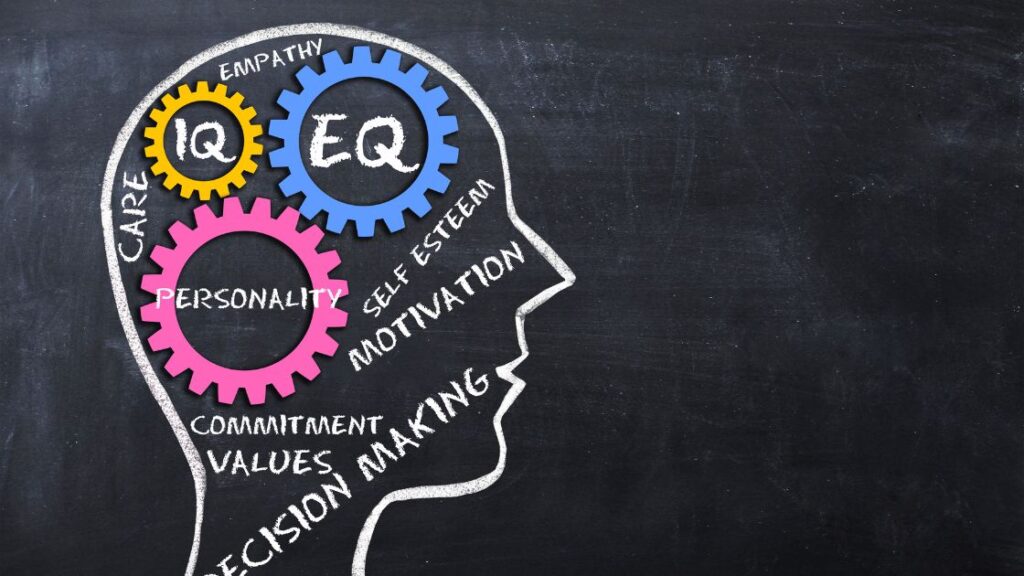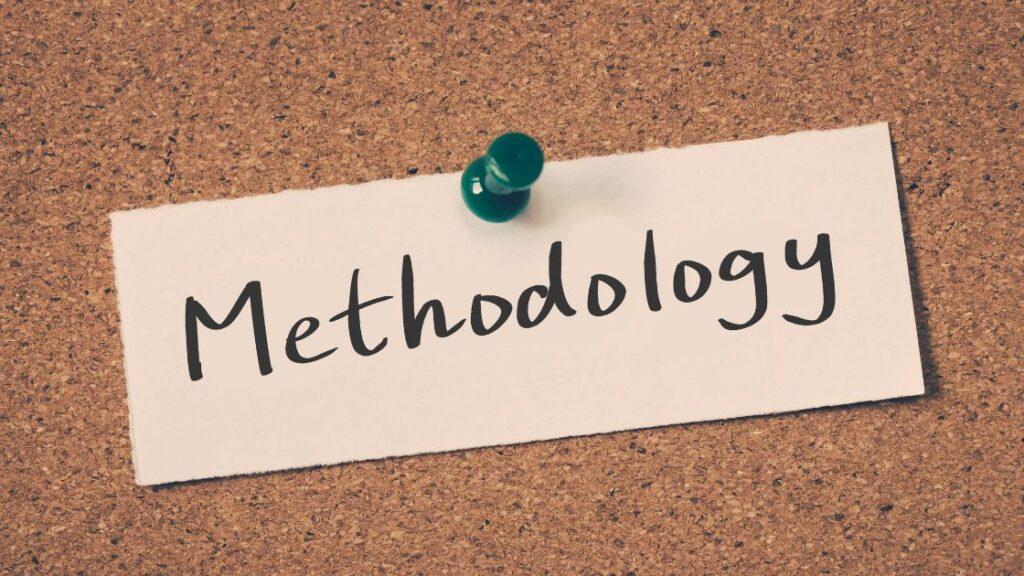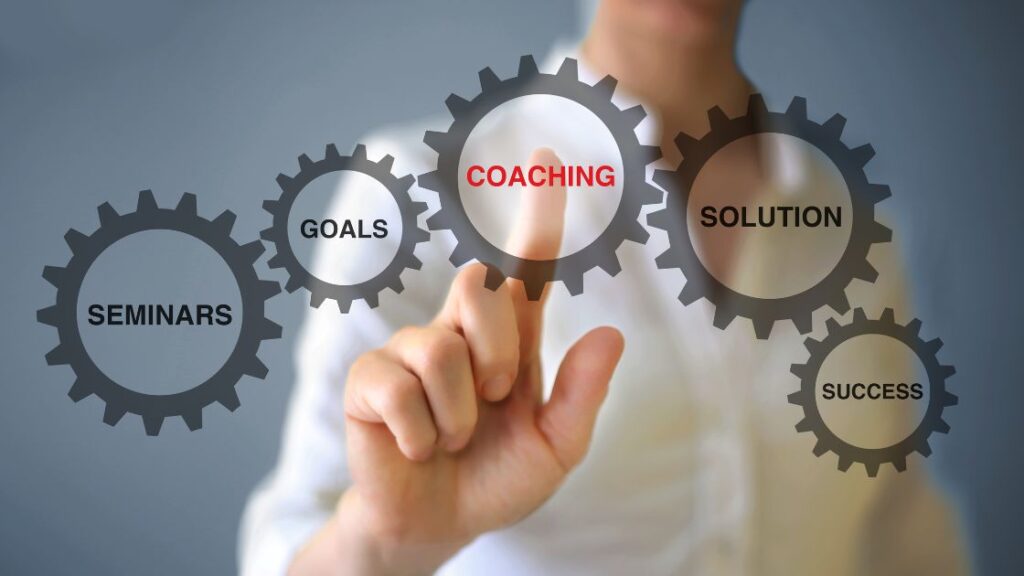Maximize the effectiveness of your coaching by using emotional intelligence coaching methods to guide client solutions.
Emotional intelligence is the foundation of any coaching.
Does the comparison seem excessive?
As like it’s letting one component of intelligence overshadow every facet of a person’s personality and existence?
If so, take into account this…
- How many successful careers have you witnessed collapse because a bright subject matter expert allowed their emotions to control them, struggled to communicate, experienced social anxiety, allowed their mood swings to cripple them, or, worse yet, failed to recognize that their behavior was unhelpful?
- How many CEOs’ aspirations of a corner office have collapsed because their peer evaluation revealed a deficiency in empathy or an over sensitivity to criticism, even when it was constructive?
- How many top achievers have had trouble striking a balance between work and life?
The incapacity to control emotions runs across all of these instances.
We have all witnessed “people persons” occasionally surpass “textbook brilliant” people, and we have all naturally recognized the difference: their capacity to control and monitor their reactions when assessing the emotions of others.
Additionally, despite possessing every desirable trait, the professional progress of exceptionally likable and emotionally astute professionals has stopped because “they just can’t handle the pressure at that level.
Even though everyone knows how important it is to control our emotions, we frequently underestimate how important they are to how our daily lives work and ultimately shape our society.
Why? We fail to see and acknowledge the significant differences between being emotionally closed, emotionally dysfunctional, and emotionally underdeveloped.
Developing behaviors that benefit both ourselves and others is the foundation of emotional intelligence, also known as emotional quotient (E.Q.), which is THE most important success component.
The search for more effective methods to guarantee client success is driving coaches to consider emotional intelligence as the new secret to high performance and work-life balance—that is, long-lasting happiness.
We’ve got a comprehensive guide on coaching emotional intelligence for you. Everything you need to know about incorporating emotional intelligence ideas into coaching is included in this guide.
It will support you:
- Determine the components that make up emotional intelligence.
- Recognize how they boost personal development
- Locate the top resources for evaluating emotional intelligence.
- tried-and-true coaching techniques to increase emotional intelligence.
Let’s get started.
Table of Contents
What Is Emotional Intelligence Coaching?

If you have ever been a team leader, you are aware that achieving success requires more than just academic aptitude. Being a leader means knowing how to use people’s abilities and group dynamics to maximize their potential in a clever way. This kind of conduct is frequently referred to as “street smarts,” or the capacity to recognize, comprehend, and complete jobs quickly.
This is known as emotional intelligence by psychologists.
The capacity to recognize, make constructive use of, and regulate your own emotions is known as emotional intelligence.
- Reduce tension
- Effective communication
- Show others empathy
- Overcome obstacles
- Defuse conflict.
Studies reveal that E.Q. is a more accurate predictor of success than previously believed, while being frequently disregarded as the less significant cousin of intelligence quotient (I.Q.). Emotional intelligence is actually the biggest predictor of success in the business, according to Dr. David Goleman, whose book “Emotional Intelligence” became an overnight blockbuster in 1995.
Such figures are noteworthy!
Remember, intelligence quotient is key. It outlines the methods by which we can solve problems and formulate predictions using logic, reason, and information.
However, in the absence of E.Q., what kind of knowledge will a person learn from their surroundings? What sort of resolution would that result in? Will profit, people, and the environment all benefit from this solution?
Let’s use an example to delve deeper…
Consider the example of team leader Peter, a kind guy whose sense of value is based on how well-liked he is by others. Peter is a very skilled engineer. Because his information filters are compromised by his fear of upsetting, he is unsure of how to handle these constraints.
When coworkers contact Peter to improve work input, he fails to provide appropriate feedback in an effort to make everyone around him pleased. Instead of encouraging the growth of his peers’ skills—his strength—he hides mistakes and disparages them. Peter undermines his colleagues and their struggles—for example, by refusing to give sick leave—in an effort to appease his superiors. He has lost credibility and trust as a result of his actions. It suggests that Peter faces difficulties with:
Compassion
Speaking up (using assertiveness)
settling disputes
These three traits, which are not optimally exhibited by Peter, are among the 12 fundamental elements of E.Q. as outlined by Dr. Goleman’s model. As a result, his staff frequently avoids him and goes directly to his boss, which has an impact on how the company operates.
This is a classic example of how people with enormous potential can be destroyed by the under- or uneven-development of emotional intelligence.
The Impact of Emotional Intelligence on Us
Performance
Physical Health
Mental Health
Relationships
Emotional Intelligence Traits

Emotional intelligence is defined by a variety of models, each of which has unique characteristics that fall into four main categories:
Self-Recognition
Social Consciousness
Self-Control
Relationship Administration
Dr. Goleman claims that the interaction of these areas gives us a set of 12 skills essential for identifying and controlling emotions for our own and others’ well-being.
Without these skills, which are acquired throughout infancy and are transferable to any stage of life, no one can perform at their best at work.
Moreover
Without simply developing across the 12-competency suit, no one can succeed.
Therefore, is it appropriate to terminate Peter and install a new employee who might end up being exactly the same or present whole other difficulties?
How can this issue be best handled inside the organization?
Since the company has already made significant investments in Peter, hiring a new employee is costly. It is also a burden for Peter, who, in spite of his flaws, displays promise, and the team.
Is there a way to make Peter and the other parties win? Indeed!
This is where coaching with E.Q. is useful.
In essence, coaching for emotional intelligence is a communication tactic. By pointing out the emotional flaws that are severely hurting them at work and at home, it assists clients in taking back control of their lives. Their ability to self-regulate, control stress reactions, and create new realities is made possible by their dynamic professional engagement.
Finding out a client’s weaknesses would lead to a solution. Even so, they wouldn’t last long because the new knowledge hasn’t been supported by the acquisition of new abilities or a strategy for using them and monitoring their effectiveness.
As a result, emotional coaching depends on teaching clients about the full range of emotional competences, how they interact, and how to develop workable solutions for pressing issues.
As a result, emotional coaching depends on teaching clients about the full range of emotional competences, how they interact, and how to develop workable solutions for pressing issues.
It needs:
- Posing pertinent queries or delegating assignments that hasten realizations
- examining regions where there is a lack of feeling or awareness
- Creating a targeted approach to close behavior gaps
- giving the customer skills relevant to their goals
- encouraging responsibility.
The learner-action approach seeks to establish self-sustaining cycles of self-observation, pattern recognition, awareness, and action-taking since a coach leads rather than feeds.
Clients can also benefit from observer input for pattern identification and correction through this procedure.
- Relieve Stress
- Communicate Effectively
- Empathize With Others
- Overcome Challenges
- Defuse Conflict
Often ignored as the less important cousin of Intelligence Quotient (I.Q.), studies show that E.Q. is a better determinant of success than previously thought.
Emotional Intelligence Statistic
Those numbers are significant!
Don’t get it wrong, I.Q. is important. It defines how we can use information, reason, and logic to arrive at solutions and make predictions.
But without E.Q., what will be the nature of information a person gathers from their environment? What kind of solution would it lead to? Will this solution work for everyone — profit, people, the planet?
Let’s dive deeper with an example…
Take the case of team leader Peter, a highly accomplished engineer who is a people pleaser — a nice guy whose self-worth depends on whether people like him or not. He does not know how to address these limitations since the fear of displeasing compromises his information filters.
To keep everyone around him happy, Peter fails to give proper feedback when colleagues approach him to improve work feedback. He covers up errors but bad-mouths his peers instead of facilitating skill development — his strength. To keep his bosses happy, Peter undermines his team and their hardships, like not allowing time off for sickness. His behaviors have cost him trust and credibility. It indicates that Peter struggles with:
Empathy
Communication (being assertive)
Resolving conflict
These are three of the 12 core characteristics of E.Q. as defined by Dr. Goleman’s model and are not desirably showcased by Peter. The result is that his team often skirts him and approaches his boss affecting how the organization works.
This is a typical case of how underdevelopment or uneven development of emotional intelligence can unravel people with great potential.
How Emotional Intelligence Affects Us
Traits of Emotional Intelligence
Many models define emotional intelligence and each has its own set of attributes that are presented under four basic categories:
Self-Awareness
Social Awareness
Self-Management
Relationship Management
According to Dr. Goleman, the interplay of these domains offers us a set of 12 capabilities that are key to recognize and regulate emotions for the growth and protection of ourselves and others.
EMOTIONAL INTELLIGENCE DOMAINS AND COMPETENCIES
No one can work optimally without these capabilities, which are learned during childhood, and remain learnable at any point of time in life.
AND
No one can excel without even development across the 12-competency suit.
So, should Peter be fired and replaced with someone new who may turn out to be the same or pose a new set of challenges altogether?
What’s the best way to address this problem at an organizational level?
Hiring a new person is expensive since the firm has already invested heavily in Peter. It is also cumbersome for the team and for Peter, who shows promise despite his shortcomings.
Can there be a win-win solution in Peter’s case? Yes!
This is where E.Q. coaching comes in.
Emotional intelligence coaching is essentially a communication strategy. It helps clients regain control of their life by identifying the emotional shortcomings costing them dearly at home and work. The dynamic professional engagement allows them to self-regulate and manage stress responses and create new realities.
Telling a client what their shortcomings are would create results. Still, they would be short-lived because the new information has not been backed by the development of new skills, a plan to put them to use, and see if it worked.
So emotional coaching relies on educating clients about the entire suite of emotional competencies, their interplay, and coming up with actionable strategies to address immediate problems.
It requires:
- Asking the right questions or assigning tasks that accelerate realizations
- Analyzing areas of emotion deficit or unawareness
- Devising a goal-oriented strategy to address behavior gaps
- Giving the client goal-appropriate skills
- Fostering accountability.
Since a coach leads, not feeds, the learner-action aims to create self-sustaining cycles of self-observation, pattern recognition, awareness, and action-taking.
The process also opens the clients to observer feedback for pattern recognition and remediation.
What Does An Emotional Intelligence Coach Do?

To reestablish equilibrium, Peter’s employer brought in an emotional intelligence coach. Three main areas of change were recognized by the coach:
Self-awareness : self-awareness through one-on-one conversations, enabling Peter to recognize the ineffectiveness of his actions. Rather than telling people what to hear, he learnt how to articulate what has to be communicated.
Social awareness : Social awareness via feedback and observation. Peter was requested to look into the effects of his people-pleaser actions. Peter found out that his actions undercut his authority, foster mistrust, and encourage ineptitude when he questioned a dependable boss.
Feedback Design supported by both the team and the individual so Peter can monitor performance without giving in to his habitual behavior or worrying about upsetting anyone.
Through these efforts, the work performance of Peter and his colleagues increased, and their office was transformed into a more productive, healthy environment.
The coach made several small adjustments that had a big impact instead of making any major ones.
This case study emphasizes how crucial relationships are.
Success is determined by the caliber of our relationships, which in turn determines the caliber of our interactions and how we react to others.
In order to develop connections that are fruitful and positive and enable everyone to perform to the best of their abilities, emotional intelligence trainers demonstrate how to make tiny but meaningful changes. They also create new behaviors with their skills that were previously unthinkable.
According to studies, it only takes 21 days for new neurons to form and 90 days to entirely alter the neural circuitry that determines how we behave. All it requires is shrewd, considerate, but firm support. This is what emotional coaching does.
A coach for emotional intelligence’s roles

Clients of emotional intelligence trainers establish robust and fruitful connections with one another and with themselves by:
encouraging self-reflection and feedback in order to support the investigation of present attitudes, values, behaviors, perceptions, and beliefs as well as motivations, feelings, and actions. This aids clients in determining whether their behavior is the result of conscious thought or an unconscious reaction. This pivotal phase establishes the parameters for the anticipated results of the coaching process.
Setting objectives and generating motivation to process feelings and alter ingrained habits that are hard to break but are not insurmountable help.
recognizing stressors or triggers, new, desired behavioral patterns, and opportunities for practicing them in order to create and carry out an action plan.
creating new, positive perspectives that are consistent with the values of the client and promote transformation in order to break bad behavior patterns.
making routine check-ins to make sure the client doesn’t revert to previous behaviors.
When you reach the intended degree of behavioral effectiveness, the coaching adventure comes to a conclusion. But this is not a simple task.
Before you can start working with customers, you must invest hours of study time and self-practice. Every client is unique, and they will all feel quite vulnerable in front of you.
But without E.Q., what will be the nature of information a person gathers from their environment? What kind of solution would it lead to? Will this solution work for everyone — profit, people, the planet?
Let’s dive deeper with an example…
Take the case of team leader Peter, a highly accomplished engineer who is a people pleaser — a nice guy whose self-worth depends on whether people like him or not. He does not know how to address these limitations since the fear of displeasing compromises his information filters.
To keep everyone around him happy, Peter fails to give proper feedback when colleagues approach him to improve work feedback. He covers up errors but bad-mouths his peers instead of facilitating skill development — his strength. To keep his bosses happy, Peter undermines his team and their hardships,
Roles of an Emotional Intelligence Coach
Emotional intelligence coaches help clients build strong and productive relationships with themselves and others by:
- Exploration
- Goal Setting
- Action Plan
- Behaviours
- Check-ins
Facilitating exploration of current behaviors, values, attitudes, perceptions, beliefs, motives, emotions, and actions through self-reflection and feedback. This helps clients understand if their actions are based on unconscious response or conscious thought. This crucial step sets the tone for the outcomes expected from the coaching journey.
Goal-setting and creating motivation to work through emotions and change derailing behaviors that are hard-wired and difficult, but not impossible, to change.
Creating and implementing an action plan by identifying stressors or triggers and identifying new, desirable behavioral patterns, and creating opportunities for practicing them.
Breaking unhealthy behavior patterns by developing new, constructive outlooks that align with client values and drive positive change.
Conducting regular check-ins to ensure the client does not slip back into old habits.
The coaching journey ends when you achieve the desired level of behavioral effectiveness. However, this job is far from easy.
It needs hours of study and self-practice before you can take on any clients, each of whom will be different and feeling very vulnerable in front of you.
Skills of an Emotional Intelligence Coach
To achieve results, a coach should have these seven skills: These are markers of emotional intelligence that all coaches should develop to ensure clients can consistently handle big emotions maturely, like:
Impulse control
Emotional self-regulation
Problem-solving
Checking procrastination
Negotiating
Communicating needs
Knowing what’s appropriate or expected in a given situation.
A great coach harnesses their clients’ interests and values in useful ways while also assisting them in discovering or rediscovering them. A client who receives excellent coaching recognizes the effects of their habits and gains the ability to identify and interrupt ineffective routines.
A great coach’s client will discover and use their own inner coach even after formal coaching is over.
Additionally, excellent performers avoid hitting a wall with the help of emotional intelligence trainers. Experts in a field like Peter can have their potential fully used.
Tools And Methodologies For EQ Coaching

I take it that an emotional intelligence coach is a personal coach with a focus on emotional intelligence? False!
Through the promotion of long-term behavioral change and a lasting understanding of emotions, EQ coaching supports clients in reaching their life goals. This calls for a thorough understanding of emotional intelligence, including how to measure it in individuals and other methods of subjective assessment like interviews.
Emotional intelligence can be measured in three general ways.
Emotional intelligence testing is more complex than I.Q. testing because it encompasses a wider range of abilities that arise from the interaction of the 12 essential qualities.
Hundreds of emotional intelligence tests have been created in the last few decades as emotional intelligence has become more and more prominent. Yet not all are supported by empirical evidence.
On a standardized E.Q. test, 100 is the usual score. An individual’s level of emotional intelligence increases with their score.
However, a low EQ does not imply indifference, emotionlessness, or stupidity. It just indicates that individuals struggle to identify, comprehend, and manage specific emotions, all of which can be enhanced with coaching!
How To Assess A Client’s Emotional Intelligence
Among the most trusted tests are:
The Emotional Quotient Inventory, or EQ-i 2.0, is one of the most popular and scientifically verified evaluation instruments. It draws on decades of study to measure and assist actual human performance and development. It evaluates 15 qualities related to dedicated talent, high-engagement teams, creative work environments, and inspirational leadership.
The multi-rater 360-Degree Assessment, also known as the EQ 360, integrates clients’ assessments of their emotional intelligence with those of their coworkers to provide a comprehensive assessment. Employers utilize it as a tool for employee development to gain understanding of relationships, behavior, and work capabilities.
The Mayer-Salovey-Caruso Emotional Intelligence Test, or M.S.C.E.I.T., is composed of twelve distinct subtests. According to the Mayer-Salovey theory, these exams assess emotional intelligence in four areas: perceiving emotions, facilitating thought, understanding emotions, and managing emotions. They show the kind and degree of emotional growth in every area.
The Dominance Influence Steadiness Conscientiousness test, also known as the DISC Profile, is a common evaluation instrument used to determine behavioral preferences. It illuminates the subject’s values, character attributes, and areas of strength. It also provides methods for enhancing interpersonal connections and communication.
Each of these assessments provides information on the client’s motives, values, and emotional strengths and weaknesses.
Key Coaching Methods

G.R.O.W Model : Goal Reality Options Will, also known as the G.R.O.W. the model, was developed by Sir John Whitmore, a pioneer in the coaching profession. He compared it to travel planning, and the method’s step-by-step approach provides an answer to the question “where do you want to reach” in life.
Specific. Measurable. Agreed/Achievable. Realistic/Relevant. Time-bound or the S.M.A.R.T. model : This has historically been used in business models where the outcomes must constantly be seen and quantifiable.
The objective and the client’s desired outcomes will determine the selection and efficacy of these techniques.
The coach must first determine if:
- The customer is motivated and driven to succeed.
- The client understands exactly what is at risk.
The most crucial thing for coaches to keep in mind is that emotional intelligence varies from person to person. While some people are born with a high E.Q., others must learn and practice to develop one.
How To Start Emotional Intelligence Coaching

You’re not alone if you think coaching in emotional intelligence has a lot of promise.
The world is getting more and more stressful, and stress has been found to be one of the main factors lowering E.Q. worldwide.
In light of this, you and your clients would greatly benefit from deciding to specialize in emotional intelligence coaching or from incorporating emotional intelligence into your current coaching repertoire.
Acquiring E.Q. will not only help you grow your coaching business, but it will also enable you to guide hundreds of people through a challenging world.
Acquiring, honing, and mastering the art of emotional coaching will also introduce you to other fields of study, like organizational sociology, psychology, and leadership and management, which are the foundations of emotional intelligence coaching.
Together, these followers develop a thorough coaching engagement that recognizes harmful behaviors, leadership and management qualities, human psychology, and develops a workable transformation plan.
Are you prepared to begin having a good influence on clients?
Also Read: Top 5 Reasons to Promote Employee Well-Being in 2024


